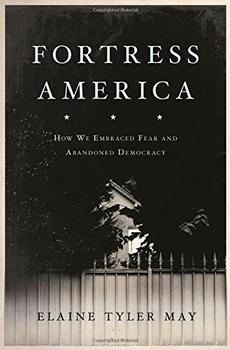Summary | Excerpt | Reviews | Beyond the Book | Readalikes | Genres & Themes | Author Bio

 Book Reviewed by:
Book Reviewed by:
Kate Braithwaite
Buy This Book
Another pre–World War II source of security for mainstream Americans came from the belief that the nation was safe from attack from abroad. Although the United States had participated in wars, no international wars had been fought on American soil for more than a century, and Europe had taken the brunt of World War I. The oceans on either side of the country seemed to offer protection; civilians did not imagine that war would threaten their safety. But that sense of security was shattered in December 1941 with the Japanese attack on Pearl Harbor, which brought the United States into World War II.
War revived the economy, putting millions of Americans to work in the defense and other industries, and thereby ending the Depression. At the same time, the war unleashed a new definition of and new urgency about security. After the attack on Pearl Harbor, national security took on a different meaning rooted in danger emanating from abroad. Security concerns became focused on protecting the nation from foreign enemies as well as protecting individuals from threats to their physical safety.
The war marked significant changes in the quest for security in other ways, too. An uneasy peace arrived in 1945, when the United States dropped atomic bombs on two Japanese cities, ushering in the Atomic Age. The war was over, but new anxieties emerged. Postwar prosperity eased economic insecurities for many, but the Cold War raised new fears about personal safety, and especially about the threat of nuclear attack from abroad and communist subversion at home.
In this new era of danger, in which the physical safety of civilians was suddenly at risk, national security became the responsibility of the government, while citizens became responsible for their own protection. In the face of possible atomic attack, officials warned Americans that the government could not protect them—they had to protect themselves. By acknowledging that the government was powerless to provide safety in such a dangerous world, political leaders and civil defense authorities unwittingly sowed the seeds of dwindling faith in government, the police, and other public institutions.
Cold War ideology promoted a fierce commitment to self-sufficiency and privatized protection. It wove together several strands of American political culture into a tough fabric constructed to withstand the harsh postwar climate and protect the American way of life. These strands included beliefs in individual freedom, unfettered capitalism, and the sanctity of the home. Many Americans came to see the world as a dangerous place, inside as well as outside the nation's borders, and became accustomed to the threat of nuclear annihilation, which fueled the development of a militarized society. They also became accustomed to the idea that communists were among them, which prompted suspicions of "outsiders" of every kind.
During the Cold War, the news media, political leaders, and large numbers of Americans became preoccupied with both national and personal security. The two were profoundly connected. At the dawn of the Atomic Age, protection against external dangers took the form of a nuclear arsenal, while protection against internal enemies took the form of a nuclear family. The United States vigorously opposed international control of nuclear arms, instead choosing to accumulate weapons, helping to cause a spiraling nuclear arms race. Rather than defusing international tensions to achieve a safer world through democratic practices in the global arena, the nation's leaders chose preparedness in the face of danger.
Americans responded with similar strategies at home. Although some citizens called upon the nation's leaders to stop the arms race, others acquiesced to the dangers of the Atomic Age by fortifying themselves with privatized protection, constant vigilance, and a bunker mentality—and for some, actual bunkers. They turned to the nuclear family, with a homemaker mother and a breadwinning father, to maintain social stability, nurture self-sufficient citizens, and provide protection in a dangerous world.
Excerpted from Fortress America by Elaine Tyler May. Copyright © 2017 by Elaine Tyler May. Excerpted by permission of Basic Books. All rights reserved. No part of this excerpt may be reproduced or reprinted without permission in writing from the publisher.





The Flower Sisters
by Michelle Collins Anderson
From the new Fannie Flagg of the Ozarks, a richly-woven story of family, forgiveness, and reinvention.

The House on Biscayne Bay
by Chanel Cleeton
As death stalks a gothic mansion in Miami, the lives of two women intertwine as the past and present collide.

The Funeral Cryer by Wenyan Lu
Debut novelist Wenyan Lu brings us this witty yet profound story about one woman's midlife reawakening in contemporary rural China.
Your guide toexceptional books
BookBrowse seeks out and recommends the best in contemporary fiction and nonfiction—books that not only engage and entertain but also deepen our understanding of ourselves and the world around us.